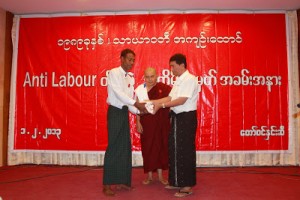Commemoration Calls Attention to Political Prisoners’ Struggle
By Burma Partnership • February 5, 2013 On 1 February, a group of former political prisoners held a public forum in Rangoon to commemorate their protest against forced prison labor in Tharawaddy Prison in 1989. The group was arrested and imprisoned after the 1988 popular uprising that was brutally crushed by the military regime. The “Anti-Labor Protest”, as they called it, was an act of resistance to the first time after the 1988 uprising that prison authorities imposed hard labor on political prisoners. It was also the first time after the uprising that prisoners stood up for their rights and the prison authorities’ first use of widespread and brutal torture against them.
On 1 February, a group of former political prisoners held a public forum in Rangoon to commemorate their protest against forced prison labor in Tharawaddy Prison in 1989. The group was arrested and imprisoned after the 1988 popular uprising that was brutally crushed by the military regime. The “Anti-Labor Protest”, as they called it, was an act of resistance to the first time after the 1988 uprising that prison authorities imposed hard labor on political prisoners. It was also the first time after the uprising that prisoners stood up for their rights and the prison authorities’ first use of widespread and brutal torture against them.
On 17 November 1989, 250 political prisoners were transferred from Insein Prison to Tharawaddy Prison in Pegu Division. On 23 November, prison authorities began to force the political prisoners to perform hard labor, but 6 people refused to do so. Authorities separated them into two groups, severely beat each of the prisoners and placed them in solitary confinement. The following day, other political prisoners demanded to see the 6 who had been taken away. When their demand was rejected, they refused to perform hard labor as well. As with the 6 original protesters, they were also sent to solitary confinement and tortured terribly. Three of these protesters died shortly after they were released from prison.
At the commemoration event in Rangoon this week, 4 survivors from the group spoke out about the incident to the 200 people gathered, including both media and the general public. This was the first time that former political prisoners have testified publicly in Burma about the various forms of torture that they endured under the military regime. The four survivors said they were doing this to expose the truth so that future generations would know what happened and to ensure that such brutality would not happen again. The survivors spoke about not wanting to take revenge and that they would try to forgive but could not forget how they suffered in prison.
Sadly, they are not alone. Political prisoners continue to face dire conditions in Burma’s prisons. They are often denied critical medical attention, as well as visits from family members who could bring sorely needed food and medicine. Min Han, a member of 88 Generation Students and the All Burma Students Democratic Front, is the most recent example of a political prisoner being denied medical attention. On 1 February, he passed away due to heart problems that he developed while in prison, just 4 months after being released from prison.
For those who have been released, there is a lack of programs available for former political prisoners to afford redress, help with rehabilitation and reintegration into a changing society. Many former political prisoners have difficulties finding work due to the persistent fear of being associated with political prisoners because of oppressive laws that remain in place, such as the Unlawful Associations Act. The Golden Harp Taxi Service is a success story of former political prisoners getting back on their feet through hard work and the support of friends and family.
In November last year, the International Committee of the Red Cross (ICRC) reached an agreement with the government that would allow it to resume prison visits with the aim of improving treatment of prisoners and their detention conditions, including the prison health system. After the ICRC President’s visit to Burma in January, he announced the committee would be starting its visits the following week, however it is not clear whether this has happened yet.
The government has also agreed to establish a mechanism to review prisoner lists and cases of concern, but there are serious concerns about the effectiveness and legitimacy of such a mechanism. The Special Rapporteur on the situation of human rights in Burma, Tomás Ojea Quintana, has called for “the involvement of relevant stakeholders, including political and civil society organisations and released prisoners themselves” in the review mechanism.
There remain many steps for Thein Sein’s government to take to rectify the situation of political prisoners: acknowledging the past treatment of political prisoners such as those involved in the Anti-Labor Protest, establishing an inclusive and effective review mechanism, releasing all remaining political prisoners, and allowing for redress, rehabilitation and reintegration. In order to ensure that human rights are respected in the future, the government must also grant the United Nations Office of the High Commissioner for Human Rights a full mandate for the protection and promotion of human rights that would include visits to detention centers.
Tags: Burma Partnership, Political PrisonersThis post is in: Blog
Related PostsBurma Partnership Celebrates Continuing Regional Solidarity for Burma and Embraces the Work Ahead for Progressive Voice
Burma Army Displays Blatant Disregard for 21st Century Panglong Peace Process
Ann Din Coal Power Plant: Local Movement and Action to Preserve and Protect Natural Resources and Land: Mon IDP Report Case Study #4
Latest Human Rights Abuse Case Demonstrates Urgent Need to Reform the Myanmar National Human Rights Commission
Human Rights Far From Guaranteed as US Sanctions on Burma Are Removed









 All posts
All posts